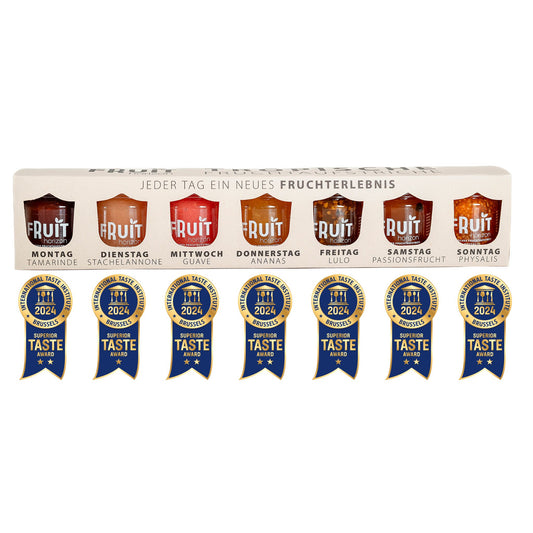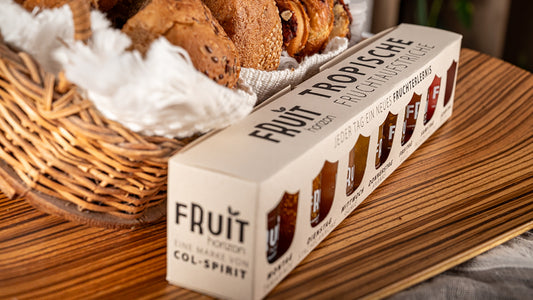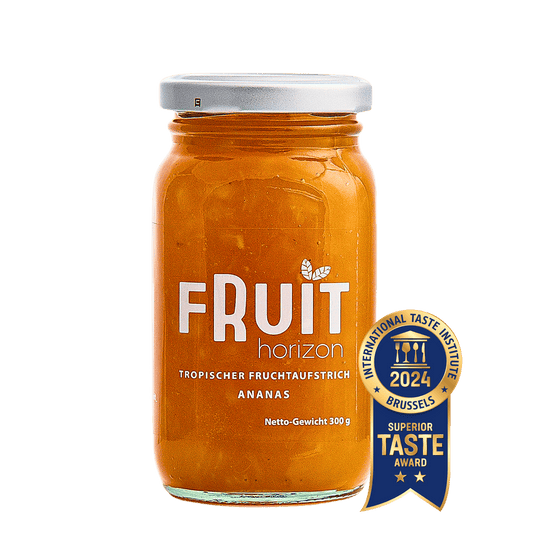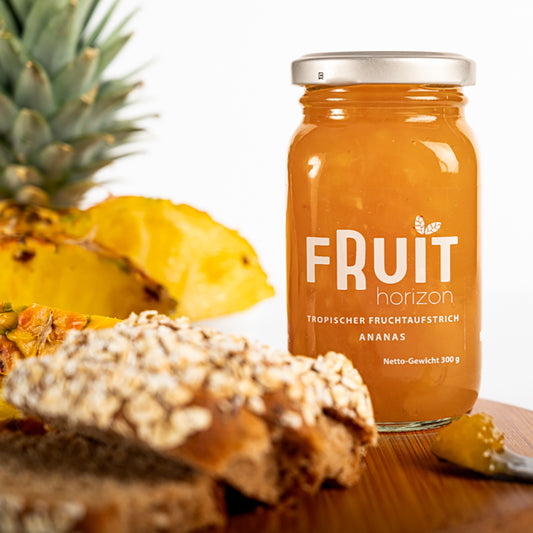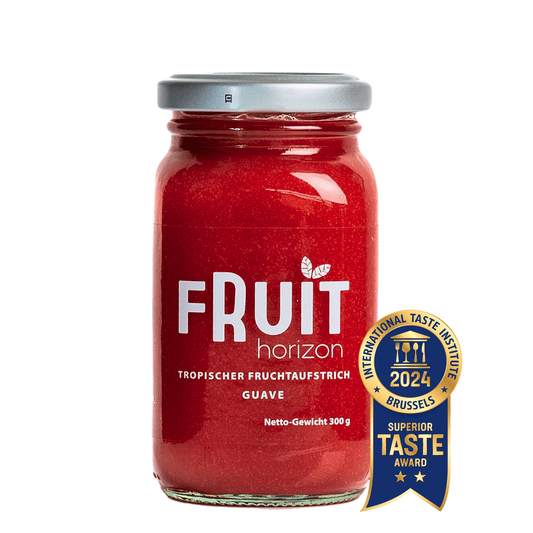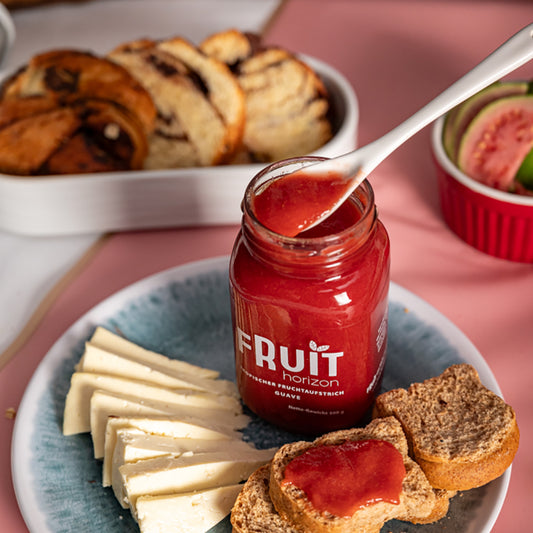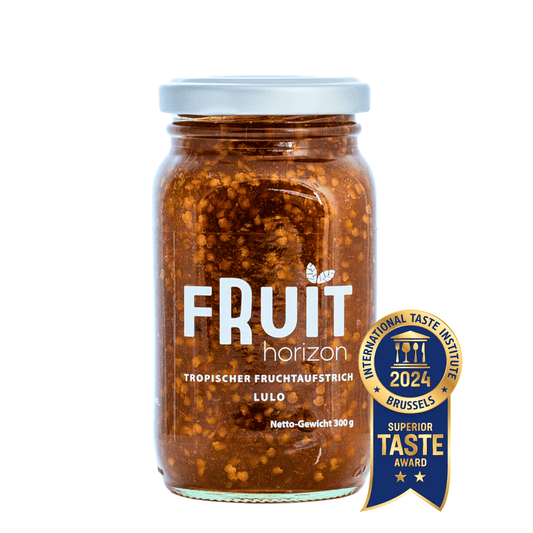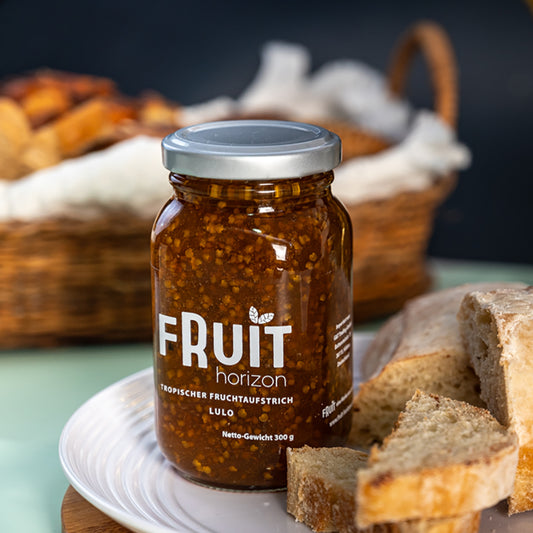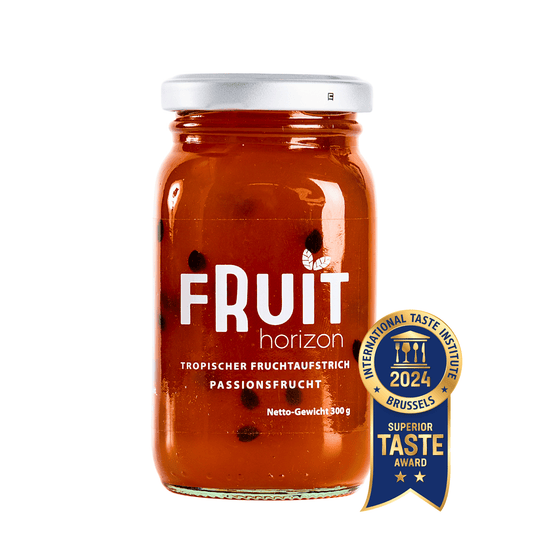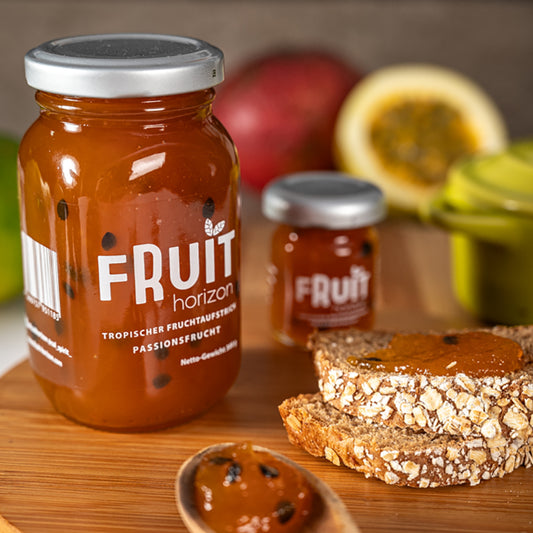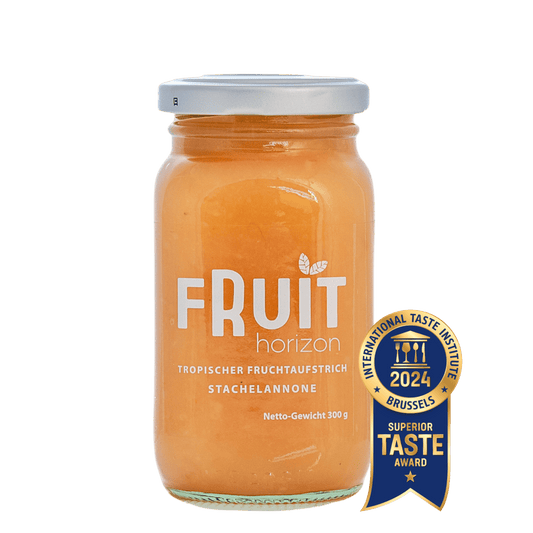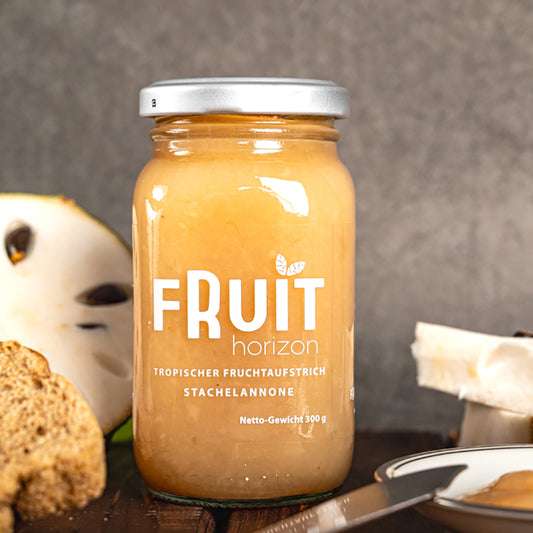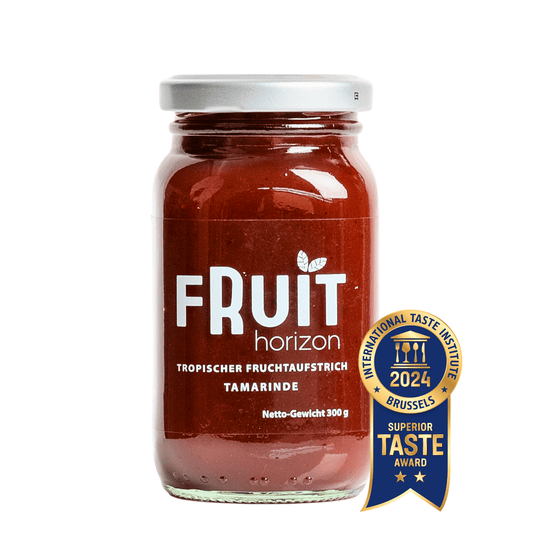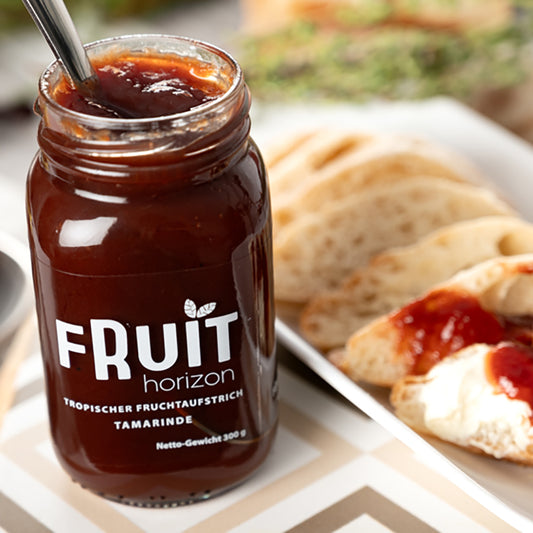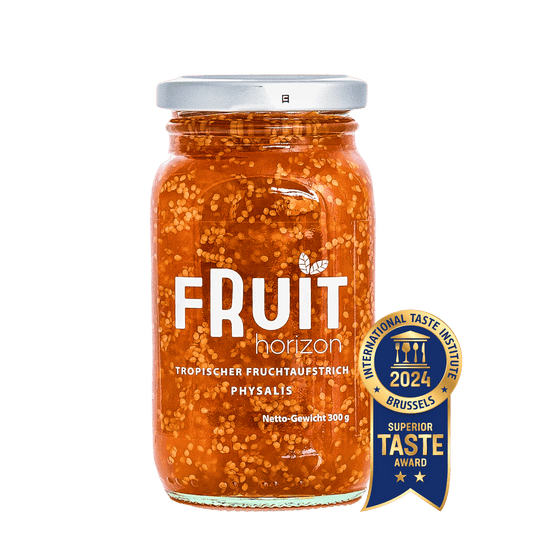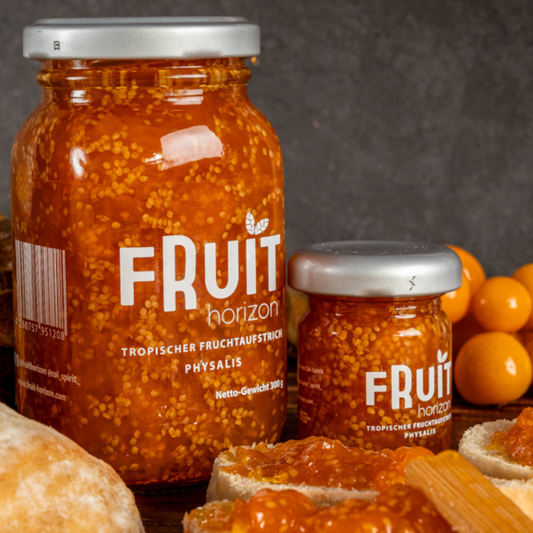Collection: Fruit Horizon
Our tropical fruit products such as award-winning jams , fruit teas and fruit infusions offer incomparable taste thanks to the processing of ripe, hand-picked fruits directly in Colombia . By trading directly with small farmers, we promote fair payment and support sustainable development of the producers and their communities.
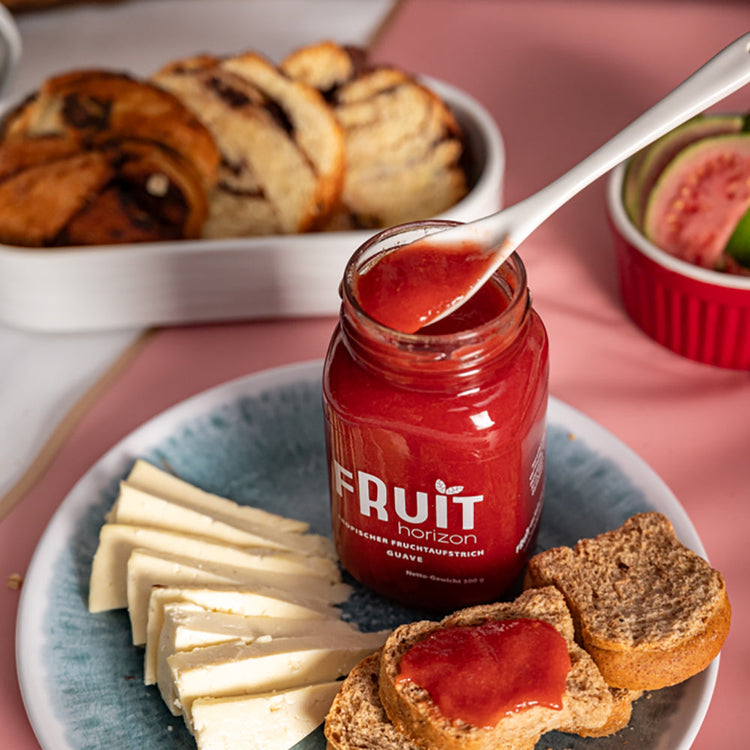
-
Fruit Horizon - Tropical Fruit Spread - All 7 Varieties 40g
Vendor:Fruit Horizon5.0 / 5.0
(12) 12 total reviews
Regular price €9,99 EURRegular priceUnit price €35,68 / per kg€17,90 EURSale price €9,99 EURSale -
Fruit Horizon - Tropical Fruit Spread - Pineapple 300g
Vendor:Fruit Horizon5.0 / 5.0
(2) 2 total reviews
Regular price €7,99 EURRegular priceUnit price €26,63 / per kg -
Fruit Horizon - Tropical Fruit Spread - Guava 300g
Vendor:Fruit Horizon5.0 / 5.0
(1) 1 total reviews
Regular price €7,99 EURRegular priceUnit price €26,63 / per kg -
Fruit Horizon - Tropical Fruit Spread - Lulo 300g
Vendor:Fruit HorizonRegular price €7,99 EURRegular priceUnit price €26,63 / per kg -
Fruit Horizon - Tropical Fruit Spread - Passion Fruit 300g
Vendor:Fruit HorizonRegular price €7,99 EURRegular priceUnit price €26,63 / per kg -
Fruit Horizon - Tropical Fruit Spread - Soursop / Guanabana 300g
Vendor:Fruit Horizon4.0 / 5.0
(1) 1 total reviews
Regular price €7,99 EURRegular priceUnit price €26,63 / per kg -
Fruit Horizon - Tropical Fruit Spread - Tamarind 300g
Vendor:Fruit HorizonRegular price €7,99 EURRegular priceUnit price €26,63 / per kg -
Fruit Horizon - Tropical Fruit Spread - Physalis 300g
Vendor:Col-SpiritRegular price €7,99 EURRegular priceUnit price €26,63 / per kg
SUPERIOR TASTE AWARD 2024
Tropical Fruit Spreads – A Piece of Colombia for Europe
Our fruit spreads and jams bring the taste of tropical fruits straight from Colombia to your table. We only use tropical fruits that are often not available in Europe . The added value remains with the small producers in Colombia, which not only supports the local economy, but also reduces CO₂ emissions and food waste.
By processing the fruit immediately after harvest, it remains optimally protected – without damage during transport and without the risk of being disposed of in Europe . Since fruit often has a high water content, we also save resources by transporting it in processed form, which is good for the carbon footprint .
Our fruits are harvested ripe , which ensures a more intense aroma . In comparison, fruits for fresh fruit transport are usually harvested unripe and only ripen on the way. Our method is therefore not only sustainable, but also ensures better taste and the highest quality .
Our jams have been awarded the "SUPERIOR TASTE AWARD 2024" by the International Taste Institute in Brussels . This award is a confirmation of the high quality and taste of our products, which were evaluated by a jury of sommeliers and star chefs in a blind tasting.
Discover the variety of our fruit spreads and experience the flavors of Colombia in your kitchen!
FAQ
Why should fruits ripen on the bush or tree?
Ripening the fruit on the bush or tree has several advantages, especially for taste, nutritional content and quality. Here are the main reasons:
- Better taste: Fruits that ripen completely on the bush or tree develop more intense aromas and a fuller taste. During the ripening process, the sugars and acids in the fruit are optimally balanced, which enhances the typical, natural taste. Fruits that are harvested unripe and then ripen later often lack this intensity of taste.
- Higher nutrient content: Fruits ripened on the tree reach their full nutritional potential. Vitamins, antioxidants and other healthy ingredients only fully develop in the final stages of ripening. Fruits that are harvested prematurely are usually lower in nutrients because the natural ripening process is interrupted.
- Optimal consistency: The texture of tree-ripened fruit is often optimal and more pleasant. They are juicier and have a better texture, while post-ripened fruit can often be firmer or mealier because it has not fully gone through the natural ripening process.
- Natural ripening: During natural ripening, the fruit produces its own ripening hormones (such as ethylene), which naturally promote the breakdown of starch and acids and the conversion into sugar. These natural processes lead to a better overall result than artificial ripening, in which ethylene is added during transport.
How many tropical fruits are there in Colombia?
Colombia is home to over 400 different species of tropical fruit, thanks to the country's climate and geographical diversity. Colombia has several climate zones and a wide range of altitudes, allowing the cultivation of a unique variety of tropical fruits.
The most famous and exported tropical fruits include bananas, avocados, mangos, pineapples and passion fruit, which are known far beyond the country's borders. In addition, there are many exotic and lesser-known fruits that are mainly intended for the domestic market, such as:
- Lulo
- Guanábana (soursop)
- Borojó
- feijoa
- tamarillo (tree tomato)
- Chontaduro
- Curuba (banana passion fruit)
- mangosteen
- Pitahaya (dragon fruit)
This variety of tropical fruits is an important part of Colombian agriculture and culture, with only a small portion being exported in large quantities. Many of the unique fruits often stay within the region and offer special flavors rarely found outside of Colombia.
Are all tropical fruits safe to eat?
Not all tropical fruits are safe to eat; some contain natural toxins or chemical compounds that can be harmful if not prepared correctly or consumed at the right ripeness. Here are some important aspects to consider when handling tropical fruits:
1. Natural toxins:
- Some tropical fruits contain substances that can be poisonous. A well-known example is the ackee fruit from Jamaica. When unripe, it contains hypoglycin A, a toxic substance that can cause severe poisoning. The fruit is only safe to eat when it is fully ripe and properly prepared.
- Cassava (yuca) , a tropical root tuber, contains hydrogen cyanide in its raw state, which is only removed by cooking or another preparation method.
2. Dangerous seeds or kernels:
- Some fruits, such as soursop (guanábana) , have seeds that are poisonous and should not be eaten. While the pulp itself is edible and tasty, the seeds contain toxic substances such as annonacin.
3. Unripe fruits:
- Certain tropical fruits are unsafe to eat when unripe. An example is the nispero fruit (loquat) , which can cause stomach pain when unripe.
- Mangoes can cause allergic reactions in some people, especially if the fruit is unripe or the peel is eaten.
4. Allergens and irritants:
- Some tropical fruits, such as pineapple, contain the enzyme bromelain, which can cause mouth irritation in sensitive people, especially if the fruit is unripe or consumed in excess.
- Cashew apples and the raw cashew nuts they contain are also inedible because they contain urushiol, an irritating substance that can cause skin reactions.
5. Proper preparation necessary:
- Some fruits, such as breadfruit , need to be cooked or fried to be safe and edible. They are inedible raw and can cause stomach problems.
Conclusion:
Most tropical fruits are safe to eat when prepared properly and consumed when ripe, but it is important to know the specific characteristics and preparation methods of each fruit to avoid potential health risks.
How many tropical fruits are exported from Colombia?
Colombia exports a wide variety of tropical fruits, but only about 15 to 20 species are exported regularly and in significant quantities. The best known and most exported tropical fruits from Colombia are:
- Bananas: Colombia is one of the world's largest exporters of bananas, which are mainly delivered to Europe and the USA.
- Avocados: The demand for Colombian avocados, especially the Hass avocado, is growing worldwide, especially in the USA and Europe.
- Pineapples: Colombian pineapples are particularly popular in North America and Europe.
- Mangos: Mangos are exported in several varieties, mainly to Europe and North America.
- Passion fruits (maracuja and granadilla): These fruits are exported both fresh and in processed form.
- Papayas: Colombian papayas are also in demand in international markets.
- Figs: Exported as fresh fruit, they are increasingly finding sales in Europe.
- Lulo and other exotic fruits: Lulo, soursop (guanábana), and mangosteen are exported in smaller quantities, often as niche products.
In addition, there are also smaller exports of exotic fruits such as pitahaya (dragon fruit) , guava , and tamarillo (tree tomato) , which are particularly popular in specific markets. Most of these fruits are exported to Europe, North America, and some Asian countries.
Colombia has the potential to further expand its tropical fruit exports, especially for lesser-known species. However, many exotic fruits grown locally currently remain mainly domestic because the international market for some varieties is not yet developed or the fruits are too fragile to transport.
What determines the quality of a jam / fruit spread?
The quality of a jam depends on various factors that together influence the taste, consistency and overall enjoyment. Here are the most important aspects that characterize a high-quality jam:
1. High-quality ingredients:
- Fresh and ripe fruit: The basis for any good jam is high-quality fruit. Ripe fruit contains more natural flavors and sugar, resulting in a more intense taste. Unripe fruit, on the other hand, can affect the taste and texture.
- Fruit content: A good jam has a high fruit content, often 50% or more. A high fruit content provides a full, natural taste and reduces the need for artificial flavors.
- Natural sweeteners: High-quality jams use natural sweeteners such as cane sugar or honey and do not contain artificial sweeteners.
2. Gentle processing:
- Fresh processing after harvest: To preserve the taste and nutrients of the fruit, it should be processed as soon as possible after harvest. This minimizes the loss of freshness and aroma.
- Low heat and short cooking time: Gentle processing at low temperatures and short cooking times helps to preserve the natural flavors and color of the fruit. Cooking times that are too long can lead to a loss of flavor and nutrients.
3. Avoid additives:
- No artificial preservatives or colorings: High-quality jams do not contain any artificial additives, which makes them more natural and often healthier.
- Minimal use of gelling agents: While pectin is often used for gelling ability, a good quality jam should not be too solid or artificial. A natural gelling process is preferable as it makes the texture smoother and the consistency balanced.
4. Taste and balance:
- Natural fruit sweetness and acidity: A good jam should offer a balance of sweetness and acidity to bring out the natural flavor of the fruit. Too much sugar can mask the flavor of the fruit.
- Intense fruit aroma: The aroma should be recognizable and authentic so that you can taste the fruit even without additional sugar or flavors.
5. Consistency and texture:
- Uniform consistency: The jam should be neither too liquid nor too solid, but should have a spreadable consistency that can be easily spread on bread or other foods.
- Chunkiness and structure: If there are pieces of fruit in the jam, they should be evenly distributed and pleasantly soft. Too much puree or too fine a structure can affect the freshness of the final product.
6. Careful storage and packaging:
- Freshness seal: High-quality jams are well sealed to keep out air and light, which can affect the taste and color.
- Transparent packaging: A glass jar allows you to see the color and consistency of the jam, which is a sign of quality and trust.
By combining all of these factors, a jam can not only taste good, but also be visually appealing and healthy. High-quality jams, such as those that have been awarded the Superior Taste Award, meet exactly these requirements and offer a unique taste experience.
With multiple columns
-

Split
Your specialist for Colombian products since 2016
-

Split
From small farmers in Colombia, fair and sustainable directly to your home
-

Split
Fast delivery with DHL thanks to our warehouse in Germany
Become a Col-Spirit Insider
Be the first to know about new products and limited offers !

